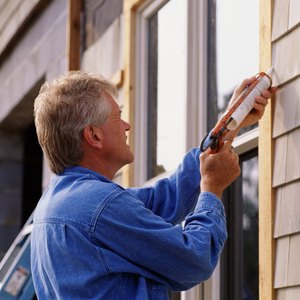
Depending on the size of your project, you might need to take out a loan to fix up your home. If you qualify, you can also deduct the interest on your home improvement loan, either as home acquisition debt or home equity debt. But to claim it, you must itemize your deductions and forgo the standard deduction. Keep in mind that these rules apply only for 2017, as they have changed in the 2018 tax bill. Identifying tax deductions for homeowners can help you save money during tax season.
Tips
Beginning in 2018, the opportunity to deduct interest on home improvement loans has been removed. That being said, a variety of tax breaks are still available for homeowners.
Claiming Acquisition Versus Equity
The significance of the distinction between home acquisition debt and home equity debt lies in the limits on how much interest can be deducted. With home acquisition debt, you can deduct the interest on up to $1 million of debt, or $500,000 per spouse if you're married filing separately. Single taxpayers may only deduct up to $500,000. With home equity debt, on the other hand, you can only deduct the interest on the first $100,000 of debt, or $50,000 per spouse if you're married filing separately. Plus, home equity debt is also subject to a total limit of $1 million when combined with acquisition debt.
The 2018 tax bill no longer allows home equity debt deductions for homeowners taking out such loans after December 31, 2017.
Deducting Interest Secured by a Home
For home tax deductions to occur on home acquisition interest or home equity interest, the home improvement loan must be secured by a qualified house. This means the bank can take the home to repay the loan if you default. As long as you meet this criterion, the interest is at least deductible as home equity debt. But, if you take out a personal loan or other unsecured loan and use the proceeds to pay for home improvements, you can't deduct the interest on your taxes.
For the purposes of deducting mortgage interest, a qualified home includes your primary residence and one second home. Qualifying homes must have bedroom, kitchen and bathroom facilities. A second home qualifies if you don't rent it out, no matter how much you use it. But, if you do rent it out at all, you must use it for at least 14 days or 10 percent of the time it was rented out, whichever is longer. If you have multiple second homes, you can only use one each year unless an exception applies.
To qualify as home acquisition debt, the proceeds must go toward substantial improvements. These are improvements that add to the value of the home, prolong the home's useful life or adapt the home to new uses. Repairs do not qualify as substantial improvements unless they are performed as part of a substantial improvement. For example, repainting the fence around your yard would just be routine maintenance and therefore considered a repair. However, if you had to dig up the entire yard, including the fence, to put in a swimming pool, the costs of replacing the fence would also count as a substantial improvement.
Filing Your Taxes
You can use Schedule A on IRS Form 1040 in order to itemize any and all deductions and tax breaks for homeowners that you may have.
References
- Internal Revenue Service: Publication 936 -- Home Mortgage Interest Deduction
- IRS: Publication 530 Cat. No. 15058K Tax Information for Homeowners for use in preparing 2017 Returns
- Internal Revenue Service. "VITA/TCE: Training Guide," Page 8. Accessed Sept. 10, 2020.
- U.S. Congress. "Public Law 115-97." Accessed Sept. 10, 2020.
- U.S. Congress. "Public Law 110-142 110th." Accessed Sept. 10, 2020.
Writer Bio
Based in the Kansas City area, Mike specializes in personal finance and business topics. He has been writing since 2009 and has been published by "Quicken," "TurboTax," and "The Motley Fool."

